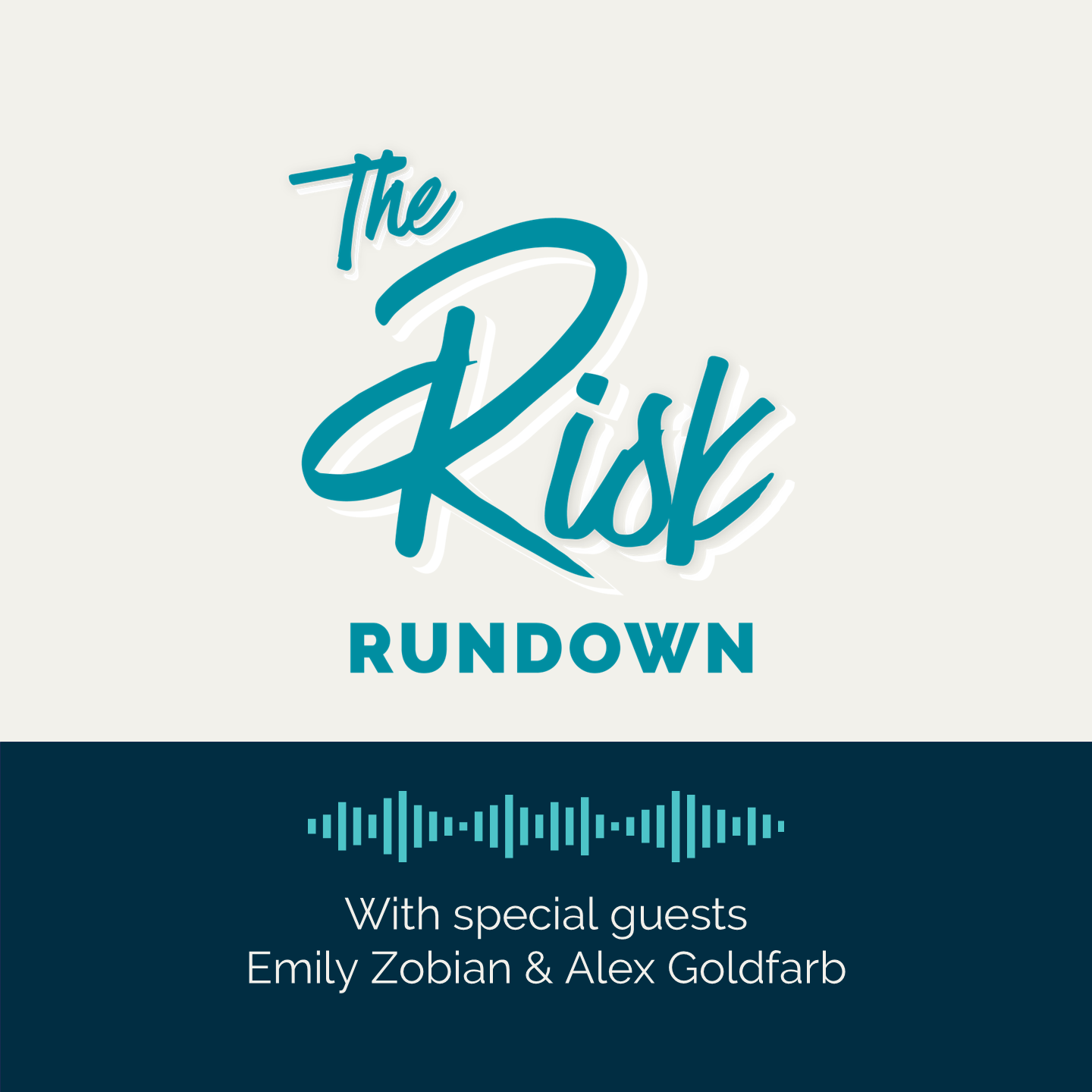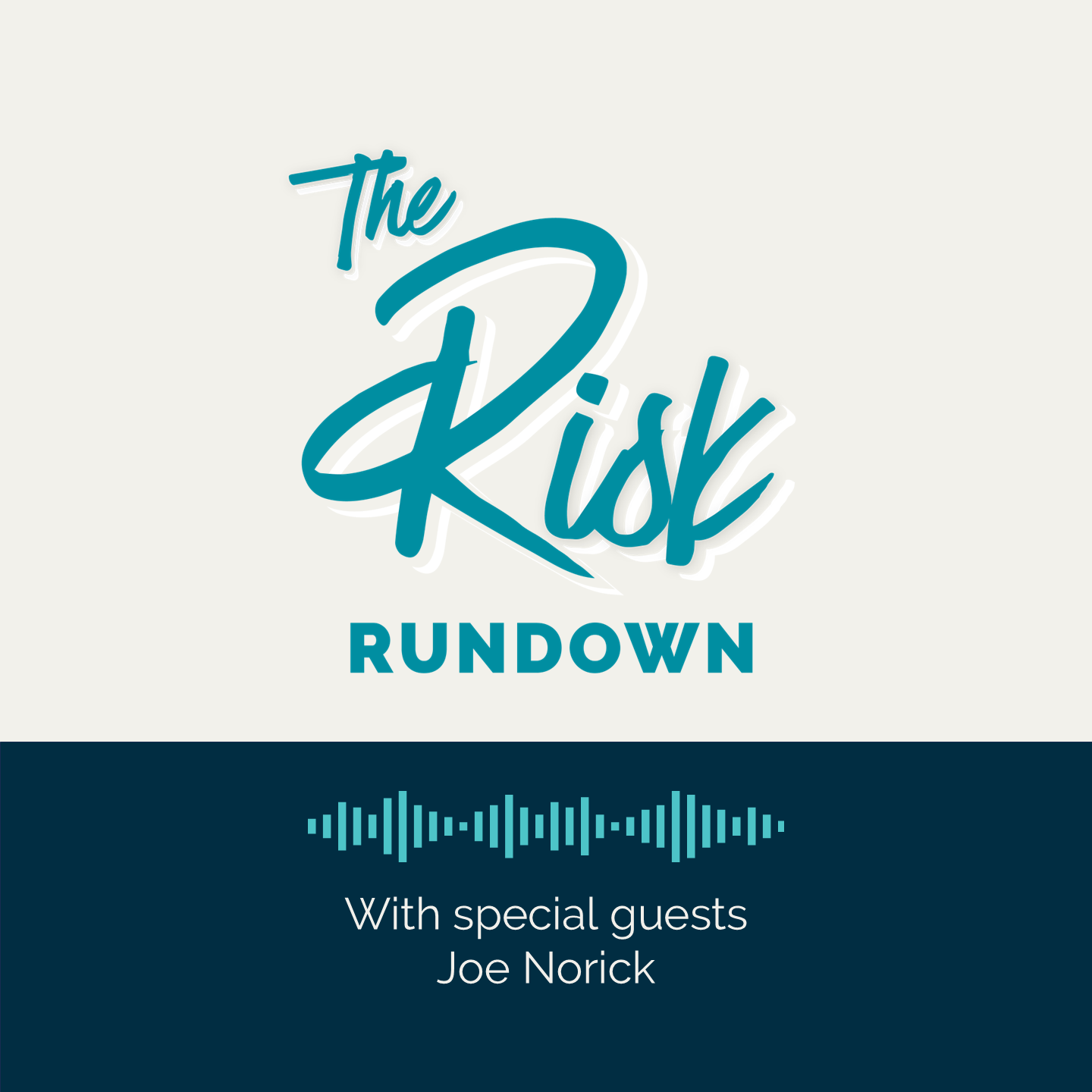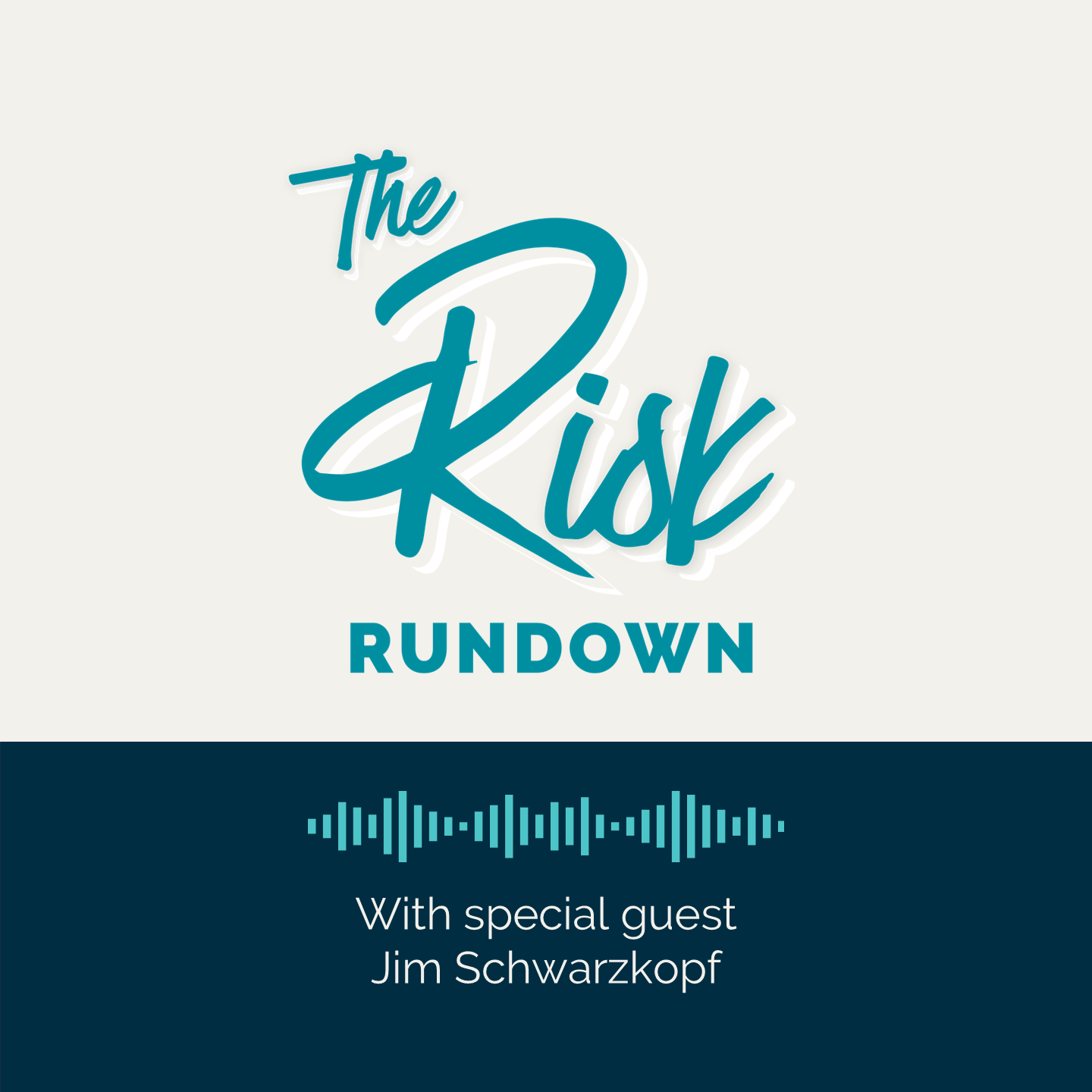Life Insurance Myths, Triggers, and Truths
Life insurance is never one-size-fits-all. And for high-net-worth clients, it is much more nuanced than obtaining a standard employer policy. Our Life Insurance Practice Leader, Steven Glick, speaks with Julie and Tyler about how understanding real-world triggers can support your family, business, and legacy goals.
Julie (00:05):
All right, welcome to The Risk Rundown. So excited to have my colleagues with us, Steve Glick, our resident life insurance expert—welcome to our episode—and Tyler Banks, my wonderful copilot.
Tyler (00:19):
Let's go!
Steve (00:21):
Thanks for having me.
Julie (00:22):
We are so excited to have you. And we are going to be talking today about life insurance, and the different reasons for it, the different ways that we can approach it, and kind of just pick your brain about different scenarios and different ways that we've been able to help clients along the way.
So Tyler, you have any wise wisdom to share with us at the beginning here?
Tyler (00:47):
Always. So Steve, life insurance is one of those things, it's like need to have versus would like to have, right?
On the property and casualty side, everyone has a need for a home and auto policy. Life insurance is one of those things that gets thrown into the insurance bucket, not understanding that it is wide and vast in how it's used for our clients and something that we obviously need to have a conversation about because I think a lot of clients are confused about life insurance. Do I need it? Do I want it? When is it appropriate to integrate life insurance into a larger trust and estate plan? So this is going to be a very thoughtful conversation, Steve. I'm looking forward to it.
Steve (01:28):
Thanks for having me on. The types of conversations that I have about life insurance are really pretty varied from day to day because of the types of clients that we have. So within private client, I would say that I'm having conversations that range from the young family who's having a child and they're now thinking about life insurance to more advanced discussions around the use of life insurance or estate planning. I think about the overarching feeling about life insurance is that people want to have as little of it as they can get away with for the shortest period of time. They want to pay the lease for it because they see it as a commodity. With my nearly 30 years of experience doing this over time, I see it less and less as a commodity.
Julie (02:27):
But also I think that it's sometimes a trigger event. Like you said, it's either someone starting a family selling a, or thinking about transferring a business into another ownership or there can be some trigger events, right?
Steve (02:42):
I think that as things change, whether it's having a child or going through a divorce, we have conversations like that or entering into a different business arrangement or entering into retirement. These things do need to be reviewed at those times because your situation changes and so your needs may change as well.
Julie (03:04):
My trigger event, honestly, just recently—and Steve, you and I worked together on this—was both my kids were out of the house. Both my kids are out of the house. They're now on their own. They're both married and so now my husband and I were really start talking about the trust and estate and how are we going to be setting up our children and grandchildren for the next generation. So that was our trigger event was not having a baby but getting them out of the house.
Steve (03:37):
Exactly. It is interesting because I do, I've been doing it long enough that people that bought term insurance policies that were supposed to last until their kids graduated college, usually. They're now over with and I will get calls all the time saying, I think I still need life insurance.
That kind of brings me to a story that I recently had with somebody who was in this sort of young child scenario. And they said, we probably just need insurance for 10 years. So in his mind, he'll have enough money to self-insure—which is something that comes out with our clients all the time—"am I going to self-insure?"
And so I said, oh, I think you should look at the cost before you decide to self-insure. But I think the self-insurance question is one that you see sort of throughout that life cycle. People start, sort of what I was saying earlier, about wanting the least amount and wanting it for a shorter period of time. There's just this knee jerk reaction. They don't really want this product, although it makes so much sense from a planning and risk management perspective, I find myself having to convince people sometimes that maybe they should look at it in a different way.
Tyler (04:49):
So we talk about, again, those personal life events, but from a business perspective, they also have life events as well. Whether they're going to recapitalize. Whether they're going to be bringing in private equity. Succession planning. These are significant things that companies and businesses and organizations need to be aware of. Are there other things that should trigger conversation for businesses, and companies, and leaders of those organizations?
Steve (05:14):
Yeah, I think in general, I think it's a review sort of a situation because what happens with a young business is they tend not to really look at it. So it's again, kind of a life cycle. They're building a business, they have an idea, maybe they put together a corporate entity and now they're just hitting the ground running. They're not thinking about what the financial ramifications are going to be of a death or a disability of an owner.
And then the business starts to mature and become more successful. And somebody, sometimes it's the CFO, sometimes it's us coming in and saying, have you addressed what would happen if you lost a key person? And if one of those key people was an owner, what would the effect be?
Because sometimes, I would say commonly, the operating agreement will call for the buyout of a deceased or disabled business owner. So there's really an obligation that's built into their agreement to begin with, but nobody's necessarily gone backwards to say, okay, can we buy insurance against that? And so we'll come in and we'll look at what the value of the business is and what the appropriate level of coverage is and what that might cost them. And it becomes even more interesting when it's a single-person-owned entity because a lot of times, what happens to the business if you're not here? Or are we really just talking about protecting your family?
Julie (06:39):
Because I mean, honestly, there might be a lot of businesses that the next generation doesn't want to take over the business. So it might be a key person that has been working there for years and years and years that wants to take over the business. And all that stuff probably should be written out and discussed before something were to happen.
Tyler (07:01):
So Steve, you bring up a lot about ownership of these businesses. Now, keyman isn't pigeonholed just to ownership and executives, but could also be used for let's say a top scientist, or a top engineer, or a top salesperson within the organization that they're really dependent on that skillset for their success. Have you used keyman life insurance in situations where it's not necessarily an ownership, but more of just a key person within the organization that they need in order to function and run at the level that they are?
Steve (07:39):
Absolutely. Because there are many of the things that you described. There are sometimes people that just have such a specific knowledge base or skillset, and it's just not easy to replicate. It could be relationships with a major vendor that the firm feels since that person wasn't here any longer, it may not continue and it could make up a large percentage of revenue for the business. It could be somebody that has a skill that's so specific—doctors for example. I worked on a scenario one time with a doctor who was very, very well known for a specific type of a procedure, and wound up bringing in investors, and they knew that without that person, their revenue would change. For the company today, you have AI, you have blockchain, and there are really limited numbers of people that can do certain types of programming. So you could be tied into somebody who's running a team for you, who you just cannot go out and find a replacement very easily and it's going to throw you off. So there's lots and lots of different specific examples, but those are just some that I've seen personally.
Tyler (08:54):
Steve, let me ask a real-life question here. My guess is that a lot of times when having conversations with individuals, they're probably saying something to the effect of, I already have a term life insurance policy that is sponsored by my company, so I'm well covered. Would you mind just touching on maybe some of the limitations of a company sponsored term life insurance product versus something more broad that having a conversation with you can provide?
Steve (08:52):
So with group life insurance, what your employer provides to you? There's a couple of things. I mean, I guess number one is if you're not healthy, there's a great benefit. You wouldn't be able to go out and buy it anyway if you are healthy, if we look at the pricing table of the group plan, you could probably own the policy for less money over 10 or 15 or 20 years by a long shot because group plans have an increasing pricing. So every five years age bands, your price goes up. So if we look at what that increase would be, we can normally find policy that are a lot less expensive. One piece that's troubling from a planning perspective is if you have a change in health and you have to part service from that employer, will the policy go with you? Meaning you are working for a company and you have a major change in health, you're no longer able to continue working. Maybe you want to go on disability. So in order to be on disability of the part service at some point. And so in most cases, those life insurance policies don't come with you. They're not portable is the term, and you're essentially leaving a life insurance program behind. So when I do planning, I always push that to the side as a non element. If it's there, it's there. We need to own this insurance on our own.
Julie (10:48):
We've talked about a lot of different scenarios and different types of policies and stuff. Tyler, you and I, we're going to just say a statement to Steve, and he's going to say yes or no. If it's true or false. So just a quick four or five questions. And Steve, you're going to just say true or false, no explanation, just true or false, yes or no.
All right. So I am young and healthy and I am good to go. I really don't need life insurance.
No gray area, you got to say true or false?
Steve (11:23):
False.
Julie (11:25):
All right, Tyler, go.
Tyler (11:26):
So I'm an individual that is looking to put money into an estate plan that is not going to be taxed. Is life insurance used in that function?
Steve (11:37):
True, yes.
Julie (11:39):
My kids are taking over my business. I got it in my will. I'm good.
Steve (11:44):
False.
Julie (11:46):
Last one, Tyler.
Tyler (11:47):
So in a divorce situation, I have a life insurance policy post-divorce. Is that life insurance policy still going to cover me and my family or is that something that needs to be revisited?
Steve (11:58):
True. It'll still cover your family.
Julie (12:00):
Okay. So I just have a quick question. If you were to choose one life event that anyone and everyone should come to you to discuss, what life event would that be?
Steve (12:11):
I would say that the life event is when you're starting a family. And I would even add that, a lot of times people know that where they're thinking that they should have a life insurance, but they don't address it right away. In thinking about that aspect and why I find myself encouraging people to do this before the baby comes, and a lot of times they don't take my advice on it because I'm basically saying when this baby comes, you're not going to sleep and you're not going to find the time to go back and address this.
Tyler (12:06):
And Steve with teenager, you still don't sleep!
Julie (12:52):
Alright, well, I just want to thank both of you guys for joining me today, Tyler, I will see you next time. But Steve, thank you so much for your time today and giving us a little words of wisdom for life insurance. And as always, stay safe and stay protected. See you next time.
Tyler (13:09):
Thanks Steve. Thanks, Julie.
Steve (13:11)
Thank you.
00:05 – Welcome
Julie introduces life insurance practice Steve Glick, kicking off a deep dive into life insurance for high-net-worth individuals—why it matters, when to review it, and how it supports both family and business goals.
00:47 – Life insurance: Need-to-have vs. nice-to-have
Tyler reframes life insurance as an essential tool, not an optional one. The team explores why affluent families often misunderstand life insurance, and how it fits into broader trust, estate, and wealth transfer strategies.
01:28 – Rethinking life insurance as a commodity
Steve explains why many people buy as little coverage as possible for the shortest time—and why that mindset misses the bigger picture. He shares how he’s seen life insurance evolve from a commodity to a cornerstone of long-term financial planning.
02:27 – Trigger events that should spark a review
Julie and Steve discuss key life triggers—like marriage, children, divorce, business changes, or retirement—that should prompt a coverage review. Julie shares her own experience revisiting her family’s trust and estate plan after becoming an empty nester.
03:37 – The truth about self-insuring
Steve shares a client story about planning to “self-insure” after ten years—and why that approach can be risky. He breaks down the real costs of self-insurance and why a proactive strategy often saves money and stress in the long run.
04:49 – Life insurance for business owners and entrepreneurs
Tyler highlights how business milestones—like recapitalization, private equity, and succession planning—should trigger an insurance conversation. Steve explains how buy-sell agreements and key person coverage protect both ownership and operations.
06:39 – What happens when the next generation doesn’t want the business
Julie raises an often-overlooked issue: what if heirs don’t want to take over the family business? The team discusses succession planning, legacy protection, and the importance of identifying future leadership before a crisis occurs.
07:39 – Key person insurance and protecting top talent
Steve explains how key person life insurance can safeguard companies that rely on highly specialized talent. Losing one critical employee can dramatically affect a company’s value and continuity.
08:54 – Hidden limitations of company-sponsored life insurance
Tyler asks about employer-provided policies. Steve outlines the downsides of group life insurance—like rising premiums, non-portable policies, and coverage gaps during health or career changes—and why personally owned policies are more reliable.
10:48 – Life insurance myths
While fun, Julie, Tyler and Steve shed light on how misconceptions and oversimplification of life insurance can lead to costly oversights.
12:11 – The most important time to buy life insurance
Steve shares the life event he recommends when everyone should review their coverage. He explains why planning ahead, before children arrive, avoids delays and ensures protection when it’s needed most.
12:52 – Final thoughts and takeaways
Julie thanks Steve and Tyler for the discussion and reminds listeners that life insurance isn’t just a policy—it’s a foundation for family and financial stability.
Thanks for your message.
We’ll be in touch shortly.







